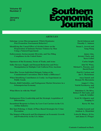Institutional Authority and Collusion
Sounthern Economic Journal 82 (1), 13–37, doi: 10.1002/soej.12065
Publication year: 2015
A “collusion puzzle” exists by which, even though increasing the number of firms reduces the ability to tacitly collude, and leads to a collapse in collusion in experimental markets with three or more firms, in natural markets there are such numbers of firms colluding successfully. We present an experiment showing that, if managers are deferential toward an authority, firms can induce more collusion by delegating production decisions to middle managers and providing suitable informal nudges. This holds not only with two but also with four firms. We are also able to distinguish compliance effects from coordination effects.

